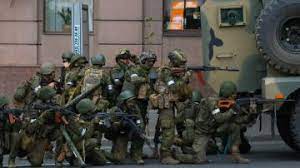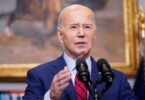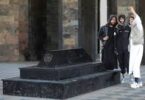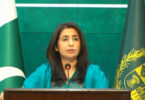MOSCOW (Agencies): Wagner chief Yevgeny Prigozhin says he ordered his mercenaries to halt their march on Moscow to avoid “shedding Russian blood”. Prigozhin said while his men are just 200km (120 miles) from Moscow, he decided on Saturday to turn them back to prevent killings.
“We are turning our columns around and going back to field camps,” he said. The comments by Prigozhin in an audio message came after Belarus’ leader Alexander Lukashenko said he negotiated with the mercenary boss to stop Wagner’s troop movement. He accepted Lukashenko’s offer to halt the Wagner group’s advance and further steps to de-escalate the tensions, Lukashenko’s office said, adding the proposed settlement contains security guarantees for Wagner troops. It did not elaborate.
Prigozhin did not say whether the Kremlin responded to his demand to oust Defence Minister Sergey Shoigu. There was no immediate comment from the Kremlin. President Vladimir Putin faced the biggest threat to his rule yet with rebel mercenaries advancing towards the Russian capital after seizing a key military base. Pavel Felgenhauer, a Russian defence analyst, said it remains to be seen how the incident plays out.
“What’s really going to happen, we’ll have to see tomorrow. And who actually did give which concessions to whom,” he told Al Jazeera. “Ceasefires don’t hold that easily. Before you see the small print, it’s not the time to say that it’s over. It can easily unravel in an hour or two, or tomorrow.” Ukrainian President Volodymyr Zelenskyy said on Saturday the revolt by Wagner troops exposed complete chaos in the country.
“Today the world can see that the masters of Russia control nothing. And that means nothing. Simply complete chaos. An absence of any predictability,” Zelenskyy said in his nightly video address. Addressing Putin while switching from Ukrainian into Russian language, Zelenskyy said: “The longer your troops remain on Ukrainian land, the greater the devastation they will bring to Russia.”
Russian mercenary chief Yevgeny Prigozhin appeared to suggest he had sent an armed convoy on a 1,200-km (750-mile) charge towards Moscow on Saturday in an unlikely attempt to topple the military leadership. Russian local officials said a military convoy was on the main motorway linking the southern part of European Russia, bordering Ukraine, with Moscow, and warned residents to avoid it.
Hours earlier, the Russian authorities had accused Prigozhin of staging an armed mutiny after he alleged, without providing evidence, that the military leadership had killed a huge number of his fighters in an air strike, and vowed to punish them. The FSB domestic security service said it had opened a criminal case against Prigozhin for armed mutiny, a crime punishable with a jail term of up to 20 years.
The dramatic turn of events, with many details unclear, looked like the biggest domestic crisis President Vladimir Putin has faced since he ordered a full-scale invasion of Ukraine – something he called a “special military operation” – in February last year. Prigozhin, whose Wagner militia spearheaded the capture of the Ukrainian city of Bakhmut last month, has for months been openly accusing Defence Minister Sergei Shoigu and Russia’s top general, Valery Gerasimov, of rank incompetence and of denying Wagner ammunition and support in its battles in Ukraine. As their feud appeared to come to a head, the ministry issued a statement saying Prigozhin’s accusations were “not true and are an informational provocation”.
Prigozhin said his actions were not a military coup. But in a frenzied series of audio messages, in which the sound of his voice sometimes varied and could not be independently verified, he appeared to suggest that 25,000 fighters were en route to oust the leaders of the defence establishment in Moscow.







